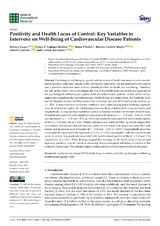Mostrar el registro sencillo del ítem
Positivity and health locus of control: key variables to intervene on well-being of cardiovascular disease patients
| dc.contributor.author | Luque, Bárbara | |
| dc.contributor.author | Farhane-Medina, Naima Z. | |
| dc.contributor.author | Villalba, Marta | |
| dc.contributor.author | Castillo Mayén, Mª del Rosario | |
| dc.date.accessioned | 2023-06-05T08:37:01Z | |
| dc.date.available | 2023-06-05T08:37:01Z | |
| dc.date.issued | 2023 | |
| dc.identifier.issn | 2075-4426 | |
| dc.identifier.uri | http://hdl.handle.net/10396/25466 | |
| dc.description.abstract | Psychological well-being is a good predictor of several health outcomes in cardiovascular disease patients (adherence, quality of life, and healthy behaviors). The perception of health control and a positive orientation seem to have a beneficial effect on health and well-being. Therefore, the aim of this study was to investigate the role of the health locus of control and positivity in the psychological well-being and quality of life of cardiovascular patients. A total of 593 cardiac outpatients completed the Multidimensional Health Locus of Control Scale, the Positivity Scale and the Hospital Anxiety and Depression Scale at baseline (January 2017) and 9 m later (follow-up; n = 323). A Spearman rank correlation coefficient and a structural equation modeling approach were determined to explore the relationships between those variables both cross-sectionally and longitudinally. A cross-sectional correlation analysis at baseline revealed that the internal health locus of control and positivity were negatively associated with anxiety (rs = −0.15 and −0.44, ps < 0.01) and depression (rs = −0.22 and −0.55, ps < 0.01) and positively associated with health-related quality of life (rs = 0.16 and 0.46, ps < 0.01). Similar outcomes were found at follow-up and in longitudinal correlations. According to the path analysis, positivity was found to be negatively associated with anxiety and depression level at baseline (β = −0.42 and −0.45, ps < 0.001). Longitudinally, positivity was negatively associated with depression (β = 0.15, p < 0.01) and together with the internal health locus of control, was positively associated with health-related quality of life (β = 0.16 and 0.10, respectively, ps < 0.05). These findings suggest that focusing on the health locus of control and especially positivity may be crucial in enhancing the psychological well-being of patients in the context of cardiac care. The potential impact of these results on future interventions is discussed. | en |
| dc.format.mimetype | application/pdf | es_ES |
| dc.language.iso | eng | es_ES |
| dc.publisher | MDPI | es_ES |
| dc.rights | https://creativecommons.org/licenses/by/4.0/ | es_ES |
| dc.source | J. Pers. Med., 13(5), 873 (2023) | es_ES |
| dc.subject | Cardiovascular disease (CVD) | es_ES |
| dc.subject | Health locus of control | en |
| dc.subject | Positivity | en |
| dc.subject | Psychological well-being | en |
| dc.subject | Health-related quality of life | en |
| dc.title | Positivity and health locus of control: key variables to intervene on well-being of cardiovascular disease patients | en |
| dc.type | info:eu-repo/semantics/article | es_ES |
| dc.relation.publisherversion | https://doi.org/10.3390/jpm13050873 | es_ES |
| dc.rights.accessRights | info:eu-repo/semantics/openAccess | es_ES |

